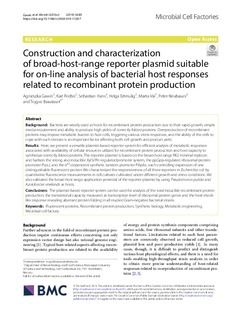| dc.contributor.author | Gawin, Agnieszka | |
| dc.contributor.author | Peebo, Karl | |
| dc.contributor.author | Sebastian, Hans | |
| dc.contributor.author | Ertesvåg, Helga | |
| dc.contributor.author | Irla, Marta Katarzyna | |
| dc.contributor.author | Neubauer, Peter | |
| dc.contributor.author | Brautaset, Trygve | |
| dc.date.accessioned | 2019-05-16T06:43:19Z | |
| dc.date.available | 2019-05-16T06:43:19Z | |
| dc.date.created | 2019-05-14T10:09:56Z | |
| dc.date.issued | 2019 | |
| dc.identifier.citation | Microbial Cell Factories. 2019, . | nb_NO |
| dc.identifier.issn | 1475-2859 | |
| dc.identifier.uri | http://hdl.handle.net/11250/2597754 | |
| dc.description.abstract | Background
Bacteria are widely used as hosts for recombinant protein production due to their rapid growth, simple media requirement and ability to produce high yields of correctly folded proteins. Overproduction of recombinant proteins may impose metabolic burden to host cells, triggering various stress responses, and the ability of the cells to cope with such stresses is an important factor affecting both cell growth and product yield.
Results
Here, we present a versatile plasmid-based reporter system for efficient analysis of metabolic responses associated with availability of cellular resources utilized for recombinant protein production and host capacity to synthesize correctly folded proteins. The reporter plasmid is based on the broad-host range RK2 minimal replicon and harbors the strong and inducible XylS/Pm regulator/promoter system, the ppGpp-regulated ribosomal protein promoter PrpsJ, and the σ32-dependent synthetic tandem promoter Pibpfxs, each controlling expression of one distinguishable fluorescent protein. We characterized the responsiveness of all three reporters in Escherichia coli by quantitative fluorescence measurements in cell cultures cultivated under different growth and stress conditions. We also validated the broad-host range application potential of the reporter plasmid by using Pseudomonas putida and Azotobacter vinelandii as hosts.
Conclusions
The plasmid-based reporter system can be used for analysis of the total inducible recombinant protein production, the translational capacity measured as transcription level of ribosomal protein genes and the heat shock-like response revealing aberrant protein folding in all studied Gram-negative bacterial strains. | nb_NO |
| dc.language.iso | eng | nb_NO |
| dc.publisher | BioMed Central | nb_NO |
| dc.rights | Navngivelse 4.0 Internasjonal | * |
| dc.rights.uri | http://creativecommons.org/licenses/by/4.0/deed.no | * |
| dc.title | Construction and characterization of broad-host-range reporter plasmid suitable for on-line analysis of bacterial host responses related to recombinant protein production | nb_NO |
| dc.type | Journal article | nb_NO |
| dc.type | Peer reviewed | nb_NO |
| dc.description.version | publishedVersion | nb_NO |
| dc.source.pagenumber | 14 | nb_NO |
| dc.source.journal | Microbial Cell Factories | nb_NO |
| dc.identifier.doi | 10.1186/s12934-019-1128-7 | |
| dc.identifier.cristin | 1697671 | |
| dc.description.localcode | © The Author(s) 2019. Open Access. This article is distributed under the terms of the Creative Commons Attribution 4.0 International License (http://creativecommons.org/licenses/by/4.0/), which permits unrestricted use, distribution, and reproduction in any medium, provided you give appropriate credit to the original author(s) and the source, provide a link to the Creative Commons license, and indicate if changes were made. | nb_NO |
| cristin.unitcode | 194,66,15,0 | |
| cristin.unitname | Institutt for bioteknologi og matvitenskap | |
| cristin.ispublished | true | |
| cristin.fulltext | original | |
| cristin.qualitycode | 1 | |

